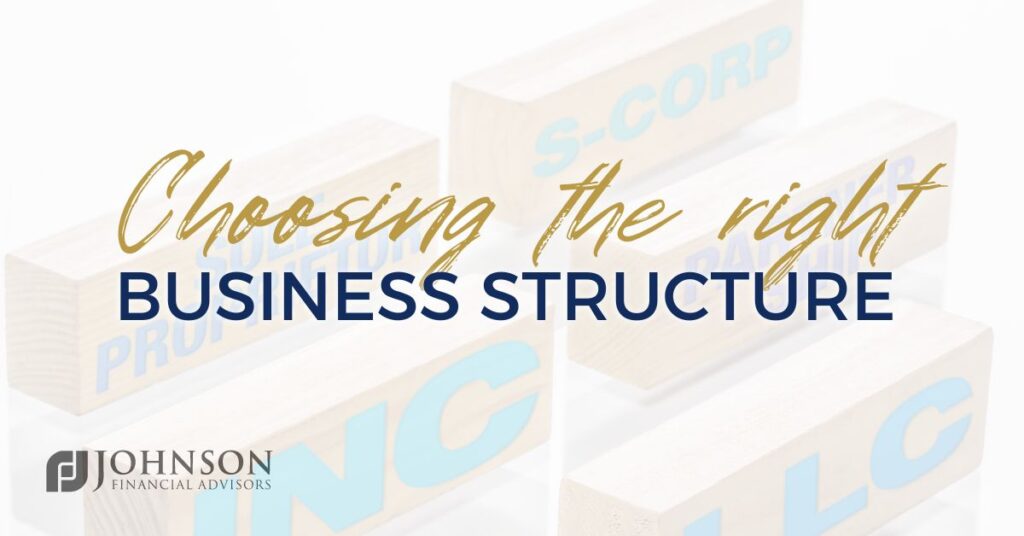
Exploring the Best Business Structure for Your Venture
The journey of starting a new business is both thrilling and challenging. With over five million new business applications submitted in 2022 alone, it’s evident that many aspiring entrepreneurs are embarking on this exciting path. One crucial question that every entrepreneur must address is, “Which business structure should I adopt?” The answer to this question will significantly impact the future of your venture, affecting taxation, liability, and even how you raise capital.
At Johnson Financial Advisors, we understand the complexities involved in selecting the right business structure. We have been helping entrepreneurs navigate these decisions for years, providing valuable insights and personalized assistance. As you consider your options, we recommend reaching out to our team for expert guidance tailored to your specific circumstances.
Let’s delve into the advantages and disadvantages of different business structures to help you make a more informed decision:
Sole Proprietorship/Partnership:
A sole proprietorship or partnership is the simplest business structure, and many startups begin this way. In a sole proprietorship, the individual and the business are one and the same. Any income generated is reported on the owner’s personal tax return. While easy to set up and maintain, this structure exposes owners to personal liability, potentially risking personal assets like their home or savings.
Advantages: Easy to set up and simple to maintain.
Disadvantages: Owners are personally liable for the business’s financial obligations, thus, exposing their personal assets (house, savings, etc.). It does not offer the prestige or sense of permanence of a corporation or LLC.
Example: John decides to open a small neighborhood bakery. As the sole proprietor, all profits from the bakery are treated as his personal income, but he is also personally responsible for any debts or legal claims the business may face.
C-Corporation:
A C-corporation is a separate legal entity from its owners, providing liability protection and the ability to raise capital through stock issuance. It offers perpetual existence, surviving even if the owner passes away. However, forming a C-corporation is more involved and expensive than a sole proprietorship or an LLC. One major drawback is the possibility of double taxation—once at the corporate level and again when profits are distributed to shareholders as dividends.
Advantages: There may be tax advantages, including more allowable business expenses. It protects owners from personal liability for the company’s financial obligations and may lend a measure of prestige and permanence.
Disadvantages: More expensive to set up, the paperwork and formality are greater than for a sole proprietorship or LLC. Income may be taxed twice, once at the corporate level and once when distributed to owners as dividend income.
Example: XYZ Corp. issues shares of stock to investors, allowing them to own a piece of the company. The corporation can also raise funds by selling additional stock to the public through initial public offerings (IPOs).
S-Corporation:
An S-corporation is a unique tax status available to certain corporations. It allows the company’s income to pass through to shareholders, avoiding double taxation. The structure provides liability protection and is especially beneficial for smaller businesses, combining aspects of a corporation and a partnership.
Advantages: S-corporations avoid the double taxation issue associated with C-corporations while enjoying many of the same tax advantages. Owners are shielded from personal liability for the company’s financial obligations. It provides the prestige of a corporation for small businesses.
Disadvantages: S-corporations do not have all the tax-deductible expenses of a C-corporation. The cost of set up, the paperwork, and formality are greater than for a sole proprietorship or LLC. S-corporations have certain restrictions, including a “100 or fewer” shareholders requirement. Shareholders must be U.S. citizens, and the business cannot be owned by another business.
Example: Sarah and Mike start a technology consulting firm and choose to become an S-corporation. The business’s income passes through to them, and they report it on their individual tax returns, benefiting from lower taxes compared to a C-corporation.
Limited Liability Company (LLC):
An LLC is a flexible business structure that blends the features of a corporation and a sole proprietorship/partnership. It provides liability protection for owners (known as members) and offers pass-through taxation, avoiding the double taxation associated with C-corporations. While forming an LLC provides some protection, it can still be more costly and require more paperwork compared to a sole proprietorship.
Advantages: LLCs provide the protections of a corporation but are taxed similarly to a sole proprietorship.
Disadvantages: Typically more expensive to form than a sole proprietorship, LLCs require more paperwork and formalized behavior.
Example: Jane and Mark open a graphic design agency as an LLC. Their personal assets are protected if the business faces any legal liabilities, and they have the freedom to manage the company without extensive formalities.
In conclusion, selecting the right business structure is a crucial step that demands careful consideration. It’s essential to weigh the advantages and disadvantages of each option based on your specific business goals and circumstances. Furthermore, remember that your choice is not set in stone; you can amend your business structure as your needs evolve.
As you embark on this journey, Johnson Financial Advisors stands ready to provide support and advice. We stand ready to assist you to align your personal financial situation with that of the proper structure for your business. We will work together with your tax and legal professionals as your financial team.
Sources:
- U.S. Census Bureau, 2023
- Investopedia, February 24, 2023
- IRS.gov, 2023
Was this response better or worse?BetterWorseSame
